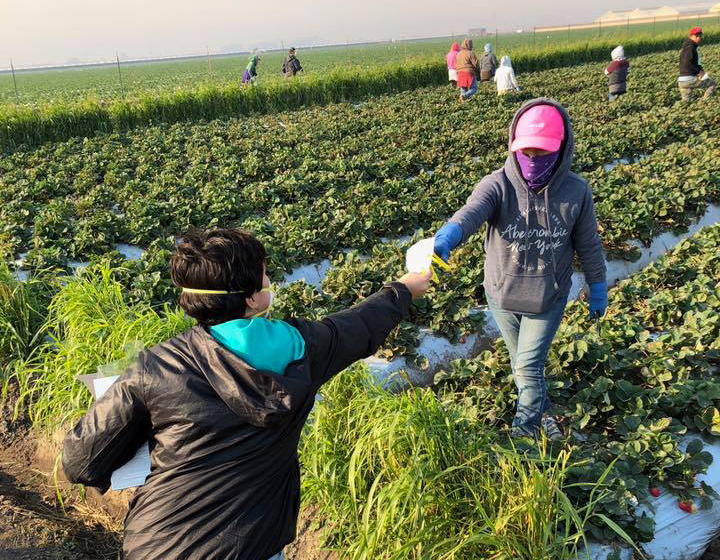Ventura Farmworkers, Spanish Speakers Left Out of Thomas Fire Emergency Response
Many Laborers Forced to Work Without Face Masks; Westside Immigrant Residents Unaware of Warnings

While all eyes shift to the western edge of the Thomas Fire as it creeps ever deeper into Santa Barbara County, immigrant rights activists back east in Ventura continue to bang the drum over what they say has been the neglectful treatment of farmworkers and Spanish speakers by their community’s farm owners and emergency response leaders. “For the Latino community, it’s been really bad,” said Lucas Zucker with CAUSE, the Central Coast Alliance United for a Sustainable Economy.
Zucker pointed to the thousands of farm laborers who’ve worked for the past week in dangerously smoky and sooty conditions without protective face masks. Air quality had deteriorated Monday and Tuesday to “hazardous” and “very unhealthy” levels, according to public-health officials. Stores soon ran out of masks, and unlike Santa Barbara County, where Direct Relief alone distributed 70,000 masks in two days, no free giveaways were organized in Ventura, Zucker said. “The disparity is stunning.”
CAUSE received donated N95 masks from as far north as Santa Rosa and as far south as San Diego. Volunteers distributed them directly to workers in Oxnard fields, many of whom had wrapped their faces in shirts and bandanas. Mostly, the volunteers met with gratitude and free berries from farm owners, but a handful took umbrage to their unannounced visits and kicked them off their properties. “Some of them were pretty aggressive,” said Zucker. He named Vacca Brothers Ranch, Rincon Pacific, and Saticoy Berry Farms. A few of the managers, said Zucker, claimed the workers had refused to wear masks. Others said they knew best how to care for their employees. “The industry can be really defensive,” he said.
Adding insult to injury, Zucker continued, many farm owners refused to shut down operations mid-week even after receiving advisories to do so from the Ventura County Farm Bureau, the Ventura County Agricultural Association, and the California Strawberry Commission. Cal/OSHA, the state’s Division of Occupational Safety and Health, released a statement warning employers that special precautions “must” be taken to protect workers. “Smoke from wildfires contains chemicals, gases and fine particles that can harm health,” the statement read. “The greatest hazard comes from breathing fine particles, which can reduce lung function, worsen asthma and other existing heart and lung conditions, and cause coughing, wheezing and difficulty breathing.”
With a rush to pick crops before they wilted under the ash, owners nevertheless dispatched their workers, masks or no masks. Complaints started flooding into Cal/OSHA, but the state agency had closed its regional headquarters in Van Nuys, which serves the Ventura area, soon after the fire began. But under mounting pressure from Ventura residents, and state legislators Monique Limón and Hannah-Beth Jackson, Cal/OSHA reopened its offices on Friday.
“It’s the employer that has to assess the situation and take the appropriate measures,” Cal/OSHA spokesperson Erika Monterroza was quoted as saying in a Friday Ventura County Star report. “We don’t have prescriptive measures. It’s all depending on the hazards that exist in the workplace at any given time.” Monterroza told the Star that the agency would not disclose how many grievances were filed, and explained it has six months to investigate a complaint. “They have no teeth,” Zucker complained.
Many field workers faced a difficult dilemma, Zucker went on ― skip work and lose much-needed pay, or toil for 10 hours a day in the smoke and suffer the health consequences. Zucker suspects many of the laborers were simply unaware of the severity of the air-quality dangers. Ventura County’s official Thomas Fire information website posted information only in English. When CAUSE brought this to the government’s attention, said Zucker, staff added a generic Google Translate link at the bottom of the page. The automated translation, though, is full of inaccuracies. Staff declined to use a fully, and more cleanly, translated version offered by CAUSE, Zucker said. Santa Barbara County, by contrast, has disseminated Thomas Fire information in both English and Spanish since the blaze erupted last Monday.
Zucker also worries about the thousands of Spanish-only speaking residents of Ventura’s Westside, who received English-only evacuation warnings and so never knew how close to danger they really were. He’s concerned they are still unaware of the public-health notice to boil tap water ― potentially tainted by ash and other fire-related contaminants ― before it’s consumed. On Friday, CAUSE staff, joined by other community volunteers, spent much of the afternoon passing out clean drinking water and protective masks throughout the working-class and immigrant neighborhood. “It’s incredible how the community has stepped up to fill the gaps where public agencies have not,” Zucker said.
CAUSE’s director, Maricela Morales, expressed similar sentiments. “We’ve been so deeply moved by the incredible outpouring of support from our community in a time of crisis,” she said in an email, specifically thanking Oxnard’s Mixteco Indígena Community Organizing Project for its help. But with the Thomas Fire growing to 230,000 acres, and farmworkers heading back into the fields Monday, Morales called the days ahead “daunting.” “We’ve faced the sobering reality that with growing natural disasters and a volatile climate, our most vulnerable community members are on the front lines and too often forgotten,” she said.



